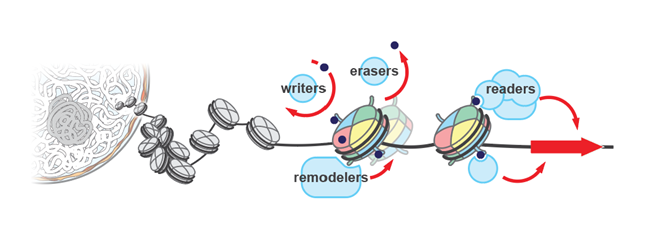
The DNA of our genome is packaged around nucleosome particles, which are composed of histone proteins. The positioning and stability of the nucleosomes relative to specific DNA sequences, their histone subunit composition, and chemical modifications are critical to the regulation of gene expression and other DNA-templated processes. Genes encoding chromatin modifying proteins are recurrently altered in cancer in ways that potentiate or even drive cancer phenotypes. This occurs via dysregulation of critical chromatin-dependent processes such as transcription and cell-fate decisions.
In 2012, the fundamental subunit of chromatin, the histone, was found to be recurrently altered by missense mutations at three amino acids in rare cancers including in pediatric brain tumors and sarcomas. These ‘oncohistone’ mutations alter chromatin by impairing the activity of important chromatin modifying enzymes.
Following on the discovery of the classical oncohistones, we identified a broad landscape of oncohistone mutations affecting multiple regions of histone proteins and histone families. The Nacev lab is exploring the mechanisms and downstream consequences of these second generation oncohistones. We employ cutting edge gene, epigenetic, and cell biology techniques to explore this evolving area of cancer biology.

